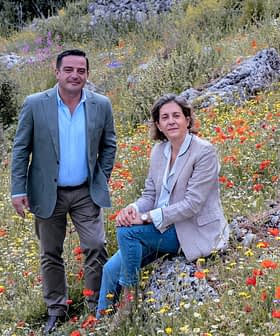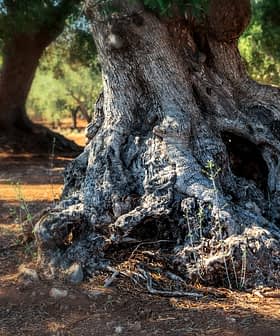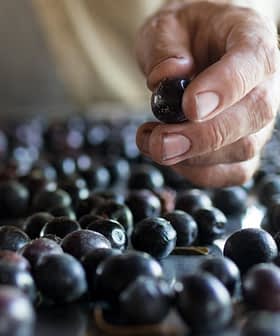Testing New Ways to Plant Olive Groves Near Madrid
Polycultural olive groves are coming to the Community of Madrid. A new operational group hopes their implementation will increase profits and safeguard against disease.
In Campo Real, Spain, olive oil producers, beekeepers, and researchers are collaborating on a project called Olivares de Miel to introduce native bees and aromatic plants to olive groves in order to increase profitability and promote agroecological tourism. This innovative approach aims to revitalize traditionally unprofitable olive groves in Madrid by diversifying crops and creating a more sustainable and aesthetically pleasing environment, while also potentially helping to prevent the spread of Xylella fastidiosa and mitigate the effects of climate change.
In the small city of Campo Real, just a half-hour southeast of Madrid, olive oil producers, beekeepers and researchers met to discuss an ambitious plan to revitalize the region’s traditionally unprofitable olive groves.
Introducing wild aromatic shrubs and flowers implies returning in some way to the preexisting equilibrium.
The operational group, which has been dubbed as Olivares de Miel or ‘olives of honey,’ aims to increase profitability through introducing a combination of native bees and aromatic plants to the olive groves.
See Also:Olive Tree Cultivation“The group aims to demonstrate that new uses can be given to olive groves in Madrid, which are traditionally not very profitable, but have great potential,” a spokesperson for the group said in a press release.
According to Olivares de Miel, the bees and aromatic plants, such as lavender and rosemary, will provide complementary revenue in between olive harvesting periods as well as open the door for agroecological tourism.
“[One advantage] for the olive groves is the aesthetics,” Javier Domínguez, a landscaping expert who is working with Olivars de Miel to design these groves, said. “Beauty attracts people, and people also pay to see that beauty.”
Producers all across Spain have been experimenting with projects like these for a few years now, partially in an effort to prevent the spread of Xylella fastidiosa and mitigate the effects of Spain’s changing climate.
The Community of Madrid already had to eradicate several olive groves in the region after detecting Xylella fastidiosa in April of last year. Farmers are eager to prevent a repeat occurrence.
Domínguez likens this change in thinking to what happened more than a century ago with the revolution in the automobile industry.
“It is like in the beginnings of the automotive industry, when there were 800 pioneers designing cars, although in the end only 50 developed them,” he said. “There are pioneers designing olive groves in Spain, plantations where there are aromatic hedges between rows of olive trees that produce oil, honey and essential oils. These pioneers have come to the same idea by independent paths, coinciding almost in time.”
Domínguez said that the practice of spacing olive trees far apart became popular 20 years ago. He argues that this was a mistake and that growing aromatic plants in between these olive trees helps protect them as well as the environment.
“The fact is that with separations of 10, 12 and 14 meters between olive trees, it is not so evident that planting something in the middle damages the olives,” he said.
Domínguez points out that it was not so long ago when farmers planted vines in between their olive trees, a practice that can still be seen in Villafranca de los Barros, a town in the Spain’s western region of Extremadura.
He said the practice stopped in modern times due to the unfounded fears that the vines and trees would compete for water and nutrients in the soil and the growth of one would harm that of the other.
In fact, the opposite may be true, Domínguez said. Having something planted in between the olive trees could help prevent flooding and avoid erosion.
“Tree monoculture lacks the appropriate complement of shrubs and flowers typical of our ecosystems,” he said. “Introducing wild aromatic shrubs and flowers implies returning in some way to the preexisting equilibrium. In addition, it mitigates floods and droughts and moderates microclimates by moving away from extreme conditions.”
In California, the practice of planting aromatic crops and introducing bees is already underway in the state’s massive almond plantations. Over the past decade, it has been mostly hailed as an economic and ecological success.
However, there is one key difference. Bees are responsible for pollinating almond plants at a much higher rate than olive trees. Nevertheless, the biodiversity that comes with a larger bee population has been shown to act as a natural check on pests, such as the olive fly, which carries Xylella fastidiosa.
Preventing the spread of the crippling disease would certainly be one of the sought after outcomes from the Olivares de Miel pilot project, which will last for three years. Olive farmers want to make sure there are no unintended consequences of changing a way of olive tree cultivation that works.
Some olive farmers have said they would like to test the method for 20 years, just to be safe. However, Domínguez believes that after three years any unintended side effects will have manifested themselves.
“Good intentions are not enough,” he said. “It is necessary to demonstrate that the intermediate crop will not harm the olives, three years gives the majority of innovators enough time to certify their progress.”
Assuming everything has gone to plan after this testing period, roughly 6.2 million more acres of Spanish olive groves could also be planted in a similar manner.









